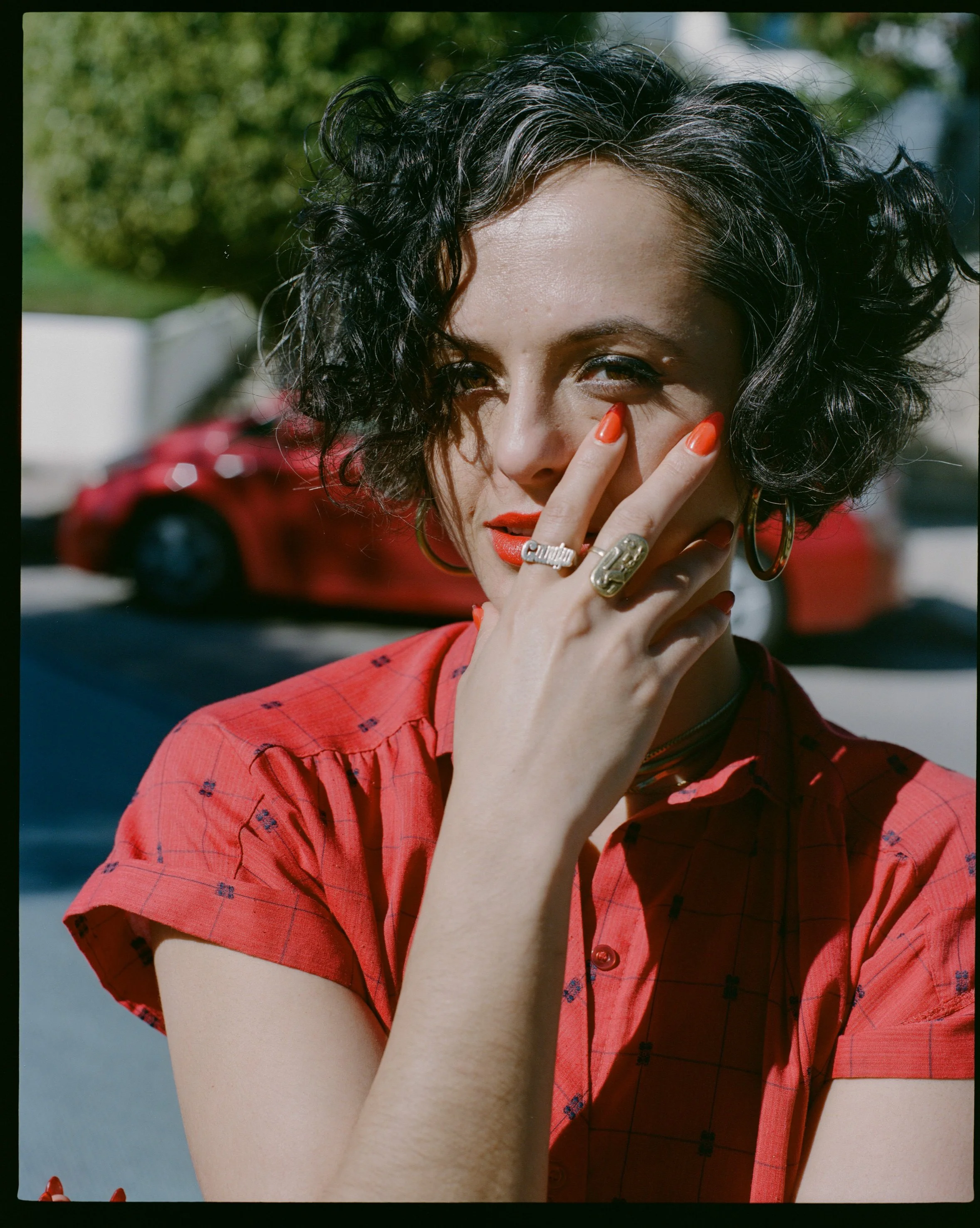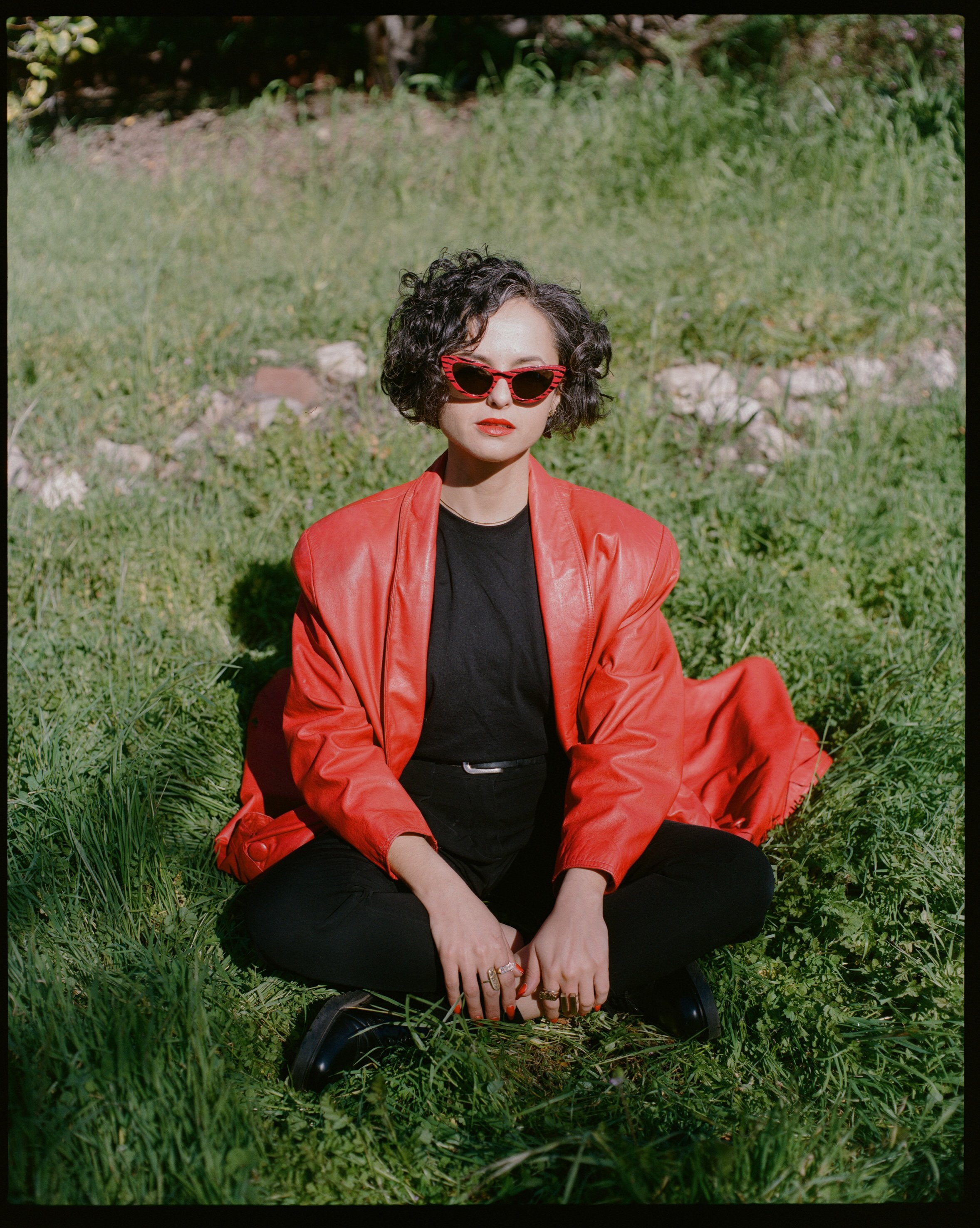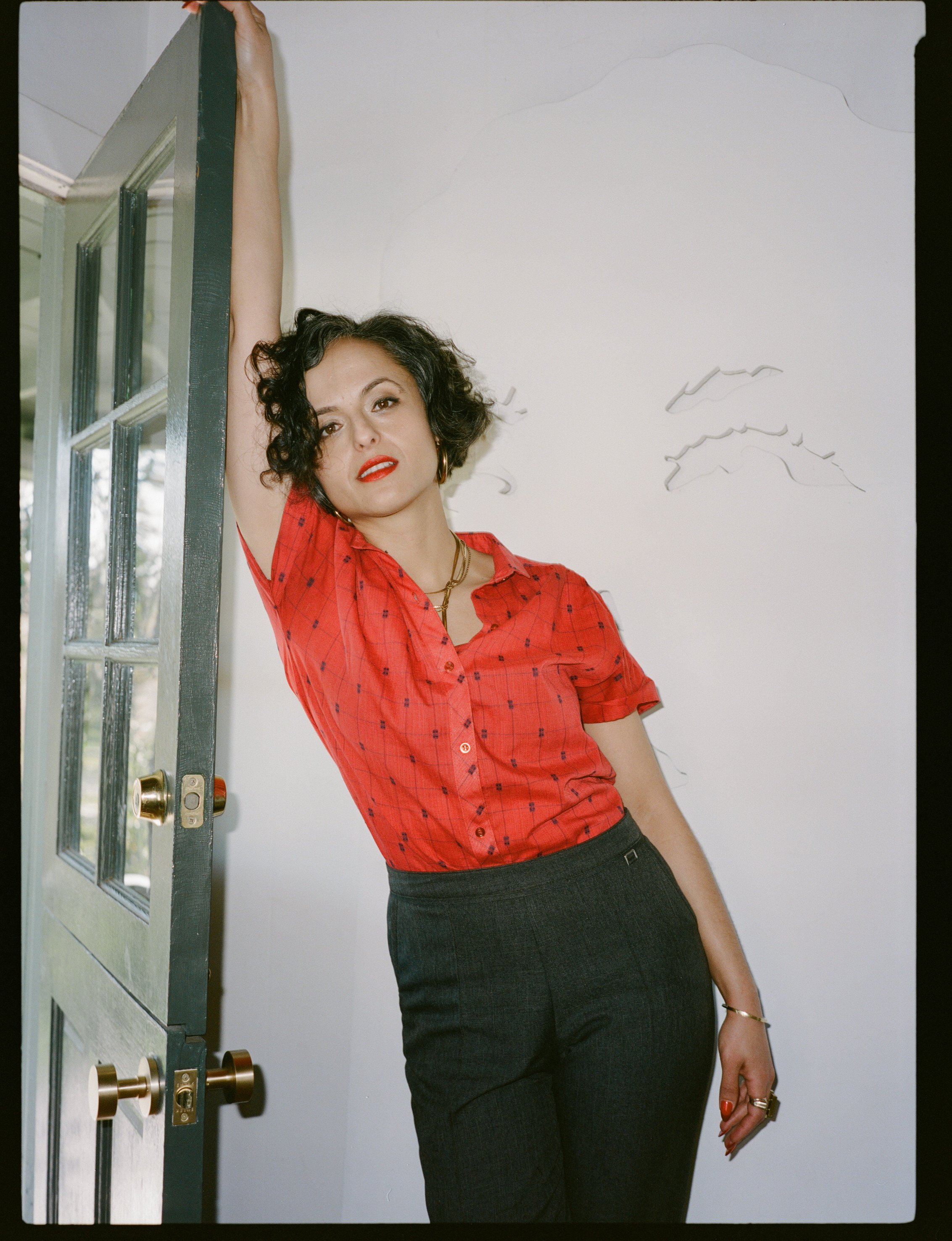Gandja Monteiro, Amidst a Torrential Downpour of Creativity
Photo by Kourtney Kyung Smith
Gandja was late to the photoshoot, but she had a good reason. “I just sold a show,” she said, hiking up a grassy hillside. Lately, she’s been directing non-stop, so it’s no surprise she needed to catch her breath. Agatha: Coven of Chaos, Brand New Cherry Flavor, the Witcher, and Wednesday, to name a few.
Watching Gandja shoot with photographer Kourtney Kyung Smith, I was reminded of her background as a dancer. Whether in front of, or behind the camera, she’s clearly in control: of her body, her mind, and now more than ever, her career. She knows where she comes from and where she’s headed.
It was great to catch up on a bright morning in Glassell Park. It was a rare moment of sunshine in the midst of the atmospheric river hovering over California the past few months. I’m not at liberty to give more details about the show she just sold, mostly because I wouldn’t want to jinx it. But suffice to say, she’s in sync with the weather here: when it rains, it pours.
Photo by Kourtney Kyung Smith
Jesy Odio: I want to start at the very beginning of Gandja.
Gandja Monteiro: Okay. So I was born in Manhattan, in Chelsea. The reason why I was born in New York was slightly accidental. My parents met in Brazil and then my Dad invited my Mom to go traveling right away. They were sort of on this traveling itinerant path and they were flying back from Indonesia where they'd gotten stuck with no money, and the layover was supposed to be in Amsterdam, but then mid-flight, the pilot had to switch the layover to New York City. So my parents decided to get off and stay there.
My Mom stayed in New York for a bit and then wound up going back to Brazil. Then my Mom got stuck in Brazil during the end of the dictatorship. And economically things were so messy that she couldn't even get paid for the fashion jobs she was doing. And so I spent the first, you could say, up until the age of eight or nine in Brazil and then moved to the US. I learned how to speak English when I was eight and spent the rest of my formative years in the Lower East side on Fourth Street between Avenue C and D. And from then on, my experience of Brazil was visiting every summer and hanging out with my Dad, my sister, and my grandparents in Rio. And maintaining my Brazilian and my love for the country and for the people, and culture in that way.
JO: How do you feel like you make a conscious effort to stay in touch with the language, the culture, and your family?
GM: I saw myself as a dual citizen, holding two passports, but holding two sides of my personality that were very much alive. And I saw it as, I don't know, there's like a potency there, there's a strength there. And I didn't want to neglect it.
My mom wasn't trying to make me assimilate. There wasn't that side of it. And also the simple fact that I was in a very culturally rich neighborhood. We called it Losaida. It's a Puerto Rican, Dominican neighborhood, especially at the time, pre-gentrification. So I think that understanding of the hearing of salsa, merengue, bachata on the streets of Manhattan. And going to school with kids who were also embracing their culture, I think that led to me wanting to make sure that I was as me as possible. And that included being very Brazilian.
JO: So when do you think you set your mind to being a director? What's your earliest memory of you heading towards that path?
GM: Well, so this is where the economic gap in colonized countries or Brazil, specifically, plays in, because when I was in Brazil before moving to New York, I really wanted to take dance classes and acting classes. But it was financially prohibitive because my dad didn't have much money. My mom didn't have much money.
But then there was a theater company called Urban New Theater that I auditioned for. It was semi-professional and I got in and I think my luck was that there I met this guy named José Joaquín García, who was a very inspired Puerto Rican artist; he's a singer, actor, director. And through Jose, I saw something that I had never seen in myself, but also this, I think he instilled in me a drive to do that thing. So I thought I was an actor, I think I really thought that the acting thing was going to be what would lead me into my 20s. So I auditioned for LaGuardia Performing Arts High School and it was a really intense process of auditioning for a 13-year-old.
I was acting, every day Stanislavski system, semi-conservatory training, very intense. And I was very dedicated. I was always a very studious, very dedicated kid. And I was very much on that path. And then I wound up doing a film course at NYU as a junior in high school. And it was a program for kids who are underrepresented in the film industry. This is before diversity was a real thing. So it was actually ahead of its time.
I think also the fact that I started trying to work as an actor at a young age. I was able to see that, especially in New York, there really weren't many roles available for a Latina that maybe didn't fit into the box. Because I'm not Hispanic, I am Brazilian. And because of that I was like, well, if these pregnant teens and crack heads, and addicts are the only roles available, then I got to do something else because I'm either never going to get a part or I'm not going to feel comfortable in the cliché version of what a young woman is.
Photo by Kourtney Kyung Smith
JO: And if you could see a glimpse into the inner workings of your directing brain, what do you see you prioritize first? I want to hear about the hamster wheel of your directing brain.
GM: I think that I feel emotion first. I always look at things and I feel first, and then from there I can go into images.
And because of that, I do have that visual side. I think that my first memories are actually going to galleries with my Dad. He's a poet and he used to make movies, and my Mom comes from the fashion world. I think that the combination of all of those things, they led me to thinking about it in a very cohesive way. But I very much think about character, motivation and the emotional arc as the jumping off point.
JO: There's always a very strong female character as the lead, or it's just a very powerful female presence. And so how do you think you are being drawn to these projects?
GM: I think I embody a feminist ideology. I grew up with very strong female figures around me. I naturally just embodied that desire to be, not just be a strong woman, but made sure that women were portrayed in a way that felt legitimate to me. So often if you watch movies that were made before, you see the gaping holes in these female characters that were written obviously by men. I want to make sure that women have agency. I think I manifested these projects because I definitely didn't plan on it.
JO: Directing is so much about the craft and the talent, but we also have to recognize the hustle and the grind that you have to put to pick the right projects and be at the right time, at the right place for Gandja to make those right moves. So how do you feel that you balance the hustle to be a director?
GM: I think that because I grew up in a low-income neighborhood and didn't have the access that wealth can bring you. Also for a long time, I was just trying to make ends meet. I've been technically hustling for the past four to five years, since I started doing television, actually, since I made that short “Control Option Escape”. And I started being intentional, but also I think because my desires were moving in that space, I was able to manifest the types of projects that I'm now working on. So I'm working more within the genre space and tapping into something that I think visually I was really attracted to as a child when I visited galleries and museums. Because it's free or cheap, that's something that we were always doing. We're always traveling on the dirt, dirt, dirt, cheap. And also when my dad would visit New York, especially with going to galleries and shows, and of course because I was in theater, being able to see the underground version of things, or the alternative approach to telling stories that perhaps didn't exist in a mainstream way or didn't really allow for a person like me, a Latina, an alternative Latina, to work within or to express.
Photo by Kourtney Kyung Smith
JO: And I know that there's so many things, there's so many answers to this question, but what is something that is at the top of your list that you wish would change about the film industry?
GM: Damn girl, that's a hard question.
JO: There's a lot of things to work on.
GM: I think there's a lack of imagination oftentimes. Once something's been made, then of course, how many times have I gone into a room where they're like, "Oh, we're trying to do the next Get Out." It's like, well, Get Out has already been made. It's like, what is the next version of it? And I understand that there's an industry, there's a business side of it that you need to be able to sell tickets or to fit into a mold, but I think that that aspect winds up hindering creativity because trying to copy and paste is sort of an oppressive way to approach creation.
And then the TV space, it's the fact that there is, well, it's creativity on a timeline. It's creativity within the constraints of the process. And because of that, we wind up, the compromise of directing TV is that, well, you might have some big ideas, but it's not going to fly because you just don't have enough time to execute it, or there's not enough resources. But even with the resources that seem pretty substantial, it still feels like there's a need to make it work within the given circumstances. And a lot of times those given circumstances don't allow for the full scope of both of the creativity to come across.
JO: In a parallel universe where you had not ended up directing, what do you think you would be doing instead?
GM: The first thing that popped into my head as a kid was architecture, but I'm not even sure where that comes from. Whether it's because of my parents' appreciation of architecture, and also being able to see the contrast between countries and cities at such an early age. Not that I was fully digesting or processing that, but I think there was a need to create or to build in my head.
JO: I can see that.
GM: In the end, I would have to do something that would pay the bills. That's something that has always been a big concern of mine, because I didn't have a trust fund behind me, or I didn't have cash to make this other version of things. And you need to be able to afford it. Plain and simple, you need to be able to afford it.
JO: Okay, final question. Looking back to where you are now, what advice would you give to young Gandja?
GM: Something that Tim Burton said to me was that people will put you in a box and you're in that box forever. So I think I would maybe say, "Hey, kick the box open."
And when I got to NYU and I was intimidated I hadn't watched every Spielberg movie, I hadn't been obsessed with all the mainstream or commercial stuff that a lot of the kids in my class were quoting. I think I would maybe say, "Fuck not knowing." And embrace what you do know.





